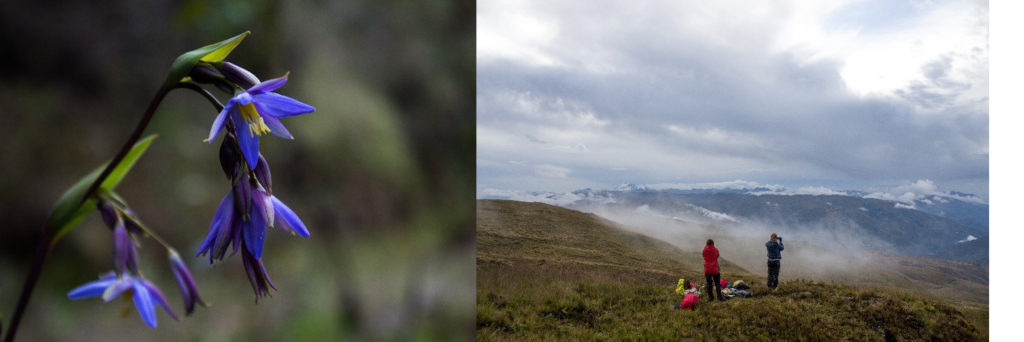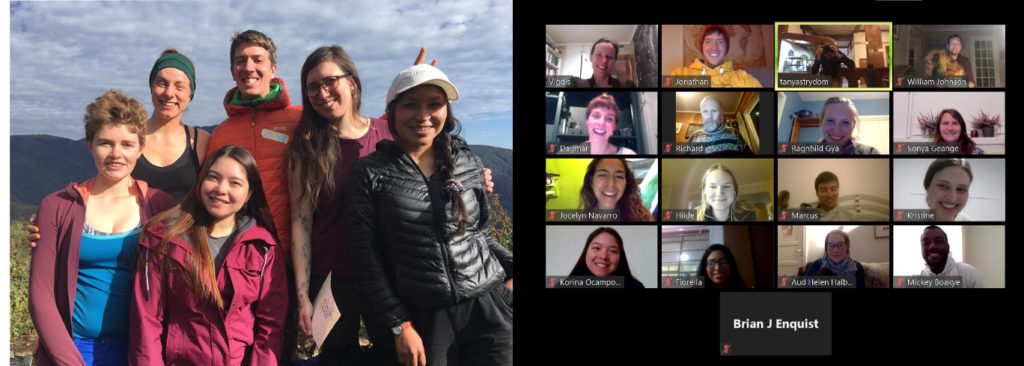So that was quite an experience. Just as I had expected beforehand, and yet in a quite different way. I saw breathtaking landscapes, had a very intense learning experience, and got to know a great bunch of people. Yet, given the circumstances under which PFTC5 ended, it is still challenging to gather my thoughts. Some of these challenges I have already touched upon in my earlier post from just after my return. Perhaps be prepared for a conjunctives in this text, even though I would rather not think too much about all the if’s and if not’s. But maybe writing this will actually help in the process, so I’ll just go with the flow.
Firstly, the nature side of things: just wow. I am lucky to have seen many mountain landscapes, but standing at almost 4000 m altitude and looking all the way down into Amazonia is simply a mighty feeling. So thinking of this one day in the field that I actually had – and the fact that it was the only one is probably an important part – gives me so many great memories, even though we probably got more rain than over my entire field season in Greenland last summer. But when the clouds opened up again, the views of the snowy peaks in the distance and the rolling ridges below us made the cold disappear in an instant. (The fact that I had followed the wise Norwegians’ advice and brought all my woolen clothing might have helped as well.) A quite different, yet similarly stunning experience was seeing the lush rainforest on the afternoon before. After a long and grey winter in Denmark, every flower seems like a real wonder – and there were a lot of wonders along the canopy walk trail.
Secondly, the science part: looking back at my thoughts before the course, I had hoped to learn about trait workflows and data handling. And I can only say, there’s nothing like the traits wheel! The efficiency, smoothness, and fun in the workflow are exemplary, and even if some aspects might be hard to transfer to smaller teams or labs, it is a highly valuable source of inspiration for any future traits campaign of mine. Even though I had previously collected my own trait data, I gained helpful insights into sampling and processing procedures. However, the learning outcome from the course goes far beyond traits. For instance, my coding skills and habits have been lifted considerably by the various input on the topic, be it pseudocoding or simply the value of empty lines in scripts. Also, I got introduced to a fascinating ecological driver, fire, that I knew hardly anything about and that I clearly underestimated before. The connection to PFTC3 nicely illustrated the value of thorough data documentation, and I know that my own and other future selves will be grateful for every minute invested into that (also, that’s a practice easy to transfer to my personal projects). Vigdis, Brian, and all the other instructors gave many great examples of how practical and encouraging teaching can look like. And, perhaps most generally and importantly: international collaboration is key in times of global challenges, bringing the need of clear and transparent communication. In that context, this course was, and is still, in the post-presence phase, a great provider of do’s and don’ts.
There is no way to know if I could have benefitted even more if we had not had the sudden interruption. Perhaps yes, in some ways, as more time sampling in the field would have sure helped to build a connection with the study system, to get to know more of the species, and to grow together as a group. Yet, being forced to collaborate remotely – in terms of coding and documenting, for instance – might actually have facilitated my awareness of how crucial it is to thoroughly document the whole scientific process. For sure, I will be able to draw a lot from this experience when planning my next such field trip.
Thirdly, the human aspect: what a fantastic group this has been. There are too many aspects in this to be listed specifically, but to see how quickly the group grew together, given the large number of people and especially – or rather facilitated by (?) – the challenge that COVID-19 put upon us, was simply amazing. It was once more a great example of the openness, positive attitude, and joy that seem to be naturally inherent to so many ecologists. It was also this working environment that made me come back into science and start a PhD, and rarely have I appreciated it more – many candidates here to be picked for the trip to the deserted island!. Still, some disappointment remains: it was a real pity that we didn’t get to spend a day out with everyone from our whole fire group. Even daily Zoom meetings could not make up for that. And to part from the group, leaving most others behind in big uncertainty, was a tough experience, while at the same time feeling so lucky to be able to go home. How fitting that a stupid misunderstanding spoiled our goodbye as well – this was certainly not the ending that the story had deserved.
Thinking of what I learned about myself, perhaps the most unexpected insight was how quickly I accepted many of the spontaneous turnarounds. I would consider myself a rather emotional person, but even though it hurt, for example to part early from the group, my brain worked surprisingly analytical. It was telling me rather clearly that this was not the time to grieve all the lost opportunities and the time we could have still shared. Still, it did take quite some time afterwards to accept that I was suddenly sitting in my quiet room in Denmark, but from a personal learning experience point of view, the chaos was definitely helpful. I guess my generally optimistic attitude took over in the right moments – which also applied to one or the other adventurous situation on the dirt roads to Wayqecha :o)
Twice I have been very close to quit my participation in PFTC5: first, before even applying, wondering if it was worth to fly halfway around the globe for two weeks of field course, and second, at the announcement of relocation to Peru, which meant that I would not get to study cushion plants in Chile, which would have been of much higher relevance for my own project. Now, I am so glad I attended. Not because I feel better about flying – actually, much of this course has demonstrated nicely that doing remote lectures and group meetings can work pretty well. But it has also proven, at least for me, that personal interaction requires physical presence, and the same is of course true for fieldwork. Looking back after four weeks, the feeling that resonates most in me is gratitude. I am grateful for the fantastic nature I could experience, the enriching scientific input I could take home, and the awesome human beings I could meet. Thanks so much to all the organisers, group leaders and everyone involved, especially also all the Peruvian helpers – this was truly a lifetime experience, and one that I wouldn’t want to miss.

